|
|
|
Sort Order |
|
|
|
Items / Page
|
|
|
|
|
|
|
| Srl | Item |
| 1 |
ID:
105388
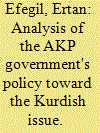

|
|
|
|
|
| Publication |
2011.
|
| Summary/Abstract |
The Kurdish issue emerged as a result of the Kemalist modernization policy. For many years Kurds and other groups were forced to absorb Turkish values and culture instead of developing their own local identities. For this reason, Kurdish uprisings occurred. By describing these uprisings as ethnic separatist movements, the government authorities instituted military measures against Kurdish groups in order to suppress their demands. But, for the first time in 1992 former President Turgut Özal accepted the reality of the Kurdish issue rather than describing it as an ethnic separatist movement. Accordingly, he suggested taking social, political and cultural measures as supplements to military operations. Özal's approach has been seriously taken up by the AKP government. As opposed to traditional policy, the existing government has noted that the problem emerged from violation of democratic rights of Kurdish people by state authorities and advocated that serious measures be taken to improve the socio-economic conditions in Southeastern Anatolia. The AKP government took considerable steps to improve democratic conditions in Turkey despite the PKK attack on the Dag(l?ca gendarme station on October 21, 2007. Permission to freely use the Kurdish language and changing the names of some towns back to original Kurdish were some of the results. But the military elites, the opposition parties - the CHP and the MHP - and the Kurdish-originated PDP party opposed the government's policy. Still, in order to find a peaceful solution to the question, the government has to make fundamental constitutional amendments in order to improve conditions and guarantee the rights of Kurdish people. In the meantime, it has to take serious steps to improve socio-economic conditions in the region as well as disarm the PKK terrorists.
|
|
|
|
|
|
|
|
|
|
|
|
|
|
|
|
| 2 |
ID:
031345
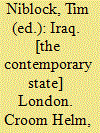

|
|
|
|
|
| Publication |
London, Croom Helm, 1982.
|
| Description |
283p.: tables, figureshbk
|
| Standard Number |
0709918100
|
|
|
|
|
|
|
|
|
|
|
|
Copies: C:1/I:0,R:0,Q:0
Circulation
| Accession# | Call# | Current Location | Status | Policy | Location |
| 020859 | 956.7043/NIB 020859 | Main | On Shelf | General | |
|
|
|
|
| 3 |
ID:
114238
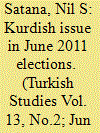

|
|
|
|
|
| Publication |
2012.
|
| Summary/Abstract |
This article analyzes the Kurdish issue in various aspects before the June 2011 elections. The main research questions include what constitutes the major grievances of the Kurds; how the ongoing conflict is framed as "Kurdish issue" versus a "terrorism problem" and how major political parties in Turkey approach the issue and its solution in their 2011 election manifestos and rallies. This article contributes the literature on the Kurdish issue in particular and Turkey's democratic consolidation in general by identifying the problems and political views of all relevant sides. Finally, based on both a historical and empirical analysis, the article reflects on the reasons why the Adalet ve Kalkinma Partisi and Baris ve Demokrasi Partisi have become the major players in addressing the Kurdish issue after the 2011 election. The findings are relevant for Turkish democratic consolidation in particular and the democratization literature in general.
|
|
|
|
|
|
|
|
|
|
|
|
|
|
|
|
| 4 |
ID:
145367
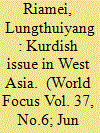

|
|
|
|
|
| Summary/Abstract |
The Kurdish question continues to be an important factor in West Asian and international politics. Kurdistan has among the largest oil reserves in West Asia. According to various studies, Kurdistan sits on 43.7 billion barrels (bb) of proven oil and 25.5bb of potential reserves. In addition, the majority of the estimated 200 trillion cubic feet of gas in Iraq is reported to be in Kurdistan region. The Kurds along with the other discontented minorities are the victims of foreign intervention (colonial/neocolonial), economic and political deprivation and political repression.
|
|
|
|
|
|
|
|
|
|
|
|
|
|
|
|
| 5 |
ID:
161142
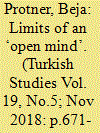

|
|
|
|
|
| Summary/Abstract |
The history of Turkey, as experienced by its minority populations, is characterized by instances of demographic and topographic engineering, war, dispossession, and political violence. Rather than being single historical events, these are longue durée systematic processes of Turkification that have continuity with contemporary political arrangements and privileges, despite the fact that the notion of Turkishness has been continuously changing. This article reflects on ethnographic research and interviews with liberal Turkish university students in Istanbul about the Turkish–Kurdish conflict, conducted during a time of relative peace and political optimism. It discusses Turkish liberals’ silencing of state violence and denial of privilege constituted through violence. This ‘forgetting’ is conceptualized as a continuous investment in Turkishness, which involves complicity. Such analysis of belonging might help to explain today’s lack of political mobilization and solidarity between the Kurdish movement and opposition groups in the present time of growing political oppression.
|
|
|
|
|
|
|
|
|
|
|
|
|
|
|
|
| 6 |
ID:
102357
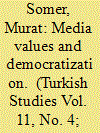

|
|
|
|
|
| Publication |
2010.
|
| Summary/Abstract |
This article presents a systematic content analysis of three religious-conservative and two pro-secular newspapers in 1996-2004 in Turkey, and discusses some findings and their implications regarding elite values and democratization: considerable internal pluralism within both religious-conservative and pro-secular elites; general consensus on democracy but not on democratic norms' application to specific issues and groups other than one's own; a division of values on religion, secularism, and social pluralism; political value change in favor of liberal democracy but social conservatism among religious-conservative elites; fragmentation and relative cynicism, but not necessarily authoritarianism, among pro-secular elites; weak ideational change on the Kurdish issue. The article argues that the press plays a significant political role as a site where elite values change or are reproduced through discussion, deliberation, or silence. Values affect and are affected by political developments.
|
|
|
|
|
|
|
|
|
|
|
|
|
|
|
|
| 7 |
ID:
177267
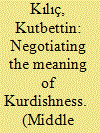

|
|
|
|
|
| Summary/Abstract |
This article examines the process of the construction of a secular Kurdish perception of identity by Kurdish political elites since the 1960s. It argues that despite the variance in group-making tactics employed by different Kurdish political groups or figures, something has remained unchanged: the construction and promotion of a secular Kurdish identity perception, which dissociates Islam from the cultural content of Kurdish ethnic identity. Kurdish political and intellectual elites in Turkey, during and after the 1960s, took a radical stance against religion and started to construct and promote a Kurdish ethnic identity perception based only on certain myths, ruling out Islam from the cultural content of Kurdish ethnic identity. Although Kurdish political elites adopted a friendlier language towards religion after the 2000s, in response to certain political and practical challenges, they never gave up on this secular Kurdish identity perception.
|
|
|
|
|
|
|
|
|
|
|
|
|
|
|
|
| 8 |
ID:
180290
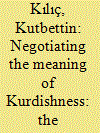

|
|
|
|
|
| Summary/Abstract |
This article examines the process of the construction of a secular Kurdish perception of identity by Kurdish political elites since the 1960s. It argues that despite the variance in group-making tactics employed by different Kurdish political groups or figures, something has remained unchanged: the construction and promotion of a secular Kurdish identity perception, which dissociates Islam from the cultural content of Kurdish ethnic identity. Kurdish political and intellectual elites in Turkey, during and after the 1960s, took a radical stance against religion and started to construct and promote a Kurdish ethnic identity perception based only on certain myths, ruling out Islam from the cultural content of Kurdish ethnic identity. Although Kurdish political elites adopted a friendlier language towards religion after the 2000s, in response to certain political and practical challenges, they never gave up on this secular Kurdish identity perception.
|
|
|
|
|
|
|
|
|
|
|
|
|
|
|
|
| 9 |
ID:
154746
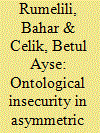

|
|
|
|
|
| Summary/Abstract |
This article contributes to the recent literature on ontological security in conflict studies by empirically investigating, through a case study of Turkey’s Kurdish issue, how ontological asymmetry complicates peace processes. Over time, all conflicts become embroiled in a set of self-conceptions and narratives vis-à-vis the Other, the maintenance of which becomes critical for ontological security. In ethnic conflicts, however, these conceptions and narratives also intersect with a fundamental ontological asymmetry, because such conflicts often pit state parties with secure existence against ethnic groups with contested status and illegitimate standing. We argue that peace processes are easier to initiate but harder to conclude in ontologically asymmetric conflicts. Accordingly, we find that during the 2009–2015 peace process in Turkey, ontological (in)security-induced dynamics presented themselves in cyclical patterns of ambitious peace initiatives receiving greater support among the Kurdish public but giving way, at the first sign of crisis, to a rapid and dramatic return to violence, which neither side acted to stem. Moreover, we underscore that ontologically asymmetric conflicts, such as Turkey’s Kurdish issue, are often characterized by a societal security dilemma, where the conditions of ontological security for one party undermine those of the other. Therefore, building consensus around a new shared peace narrative may not be possible or desirable, and a lasting solution to Turkey’s Kurdish issue depends on the development of an agonistic peace around coexisting, multiple and contestatory narratives.
|
|
|
|
|
|
|
|
|
|
|
|
|
|
|
|
| 10 |
ID:
145645
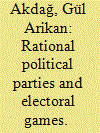

|
|
|
|
|
| Summary/Abstract |
Based on spatial modeling, this study introduces the Kurdish Opening policy of the AKP to resolve the Kurdish problem in Turkey as a rational strategy to increase its electoral support. On one hand, through the analysis of the effective numbers of parties, margins of victory in the Kurdish populated region and provinces it shows that the AKP and the pro-Kurdish parties are the main competitors among Kurdish voters, yet the competition the two parties face is not uniform across the provinces. On the other hand, shifts in Islamist vote and volatility rates indicate the presence of a large amount of religiously oriented ethnic voters who are sensitive to positional change especially in the provinces where the AKP is overrepresented in the parliament. More generally, the study confirms that the AKP's move on the Kurdish issue should be evaluated as a rational strategy that increases the number of potential swing voters for the party.
|
|
|
|
|
|
|
|
|
|
|
|
|
|
|
|
| 11 |
ID:
190814
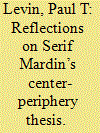

|
|
|
|
|
| Summary/Abstract |
It would be an understatement to say that Şerif Mardin’s center-periphery thesis (CPT) has been influential on contemporary understandings of Turkey. This essay reflects on the impact of the CPT, considers the challenges from both critics and a changing empirical reality, and discusses whether it still has something to offer us today. It argues that some of the criticisms levied at Mardin’s thesis are based on a misunderstanding of the role of simplification in social science, while others point to important shortcomings of the theory without presenting an alternative framework. However, the article suggests that the anomalies in the CPT have by now amassed to the point that it no longer serves as a meaningful approximation of key dynamics in Turkish politics, primarily because it fails to capture the importance of the Kurdish issue and the consolidation of the ruling AKP at the center.
|
|
|
|
|
|
|
|
|
|
|
|
|
|
|
|
| 12 |
ID:
121874
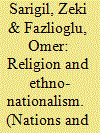

|
|
|
|
|
| Publication |
2013.
|
| Summary/Abstract |
One approach within the Islamic camp treats Islam, which emphasizes overarching notions such as the 'Islamic brotherhood' and 'ummah', as incompatible with ethno-nationalist ideas and movements. It is, however, striking that in the last decades, several Islamic and conservative groups in Turkey have paid increasing attention to the Kurdish issue, supporting their ethnic demands and sentiments. Even more striking, the leftist, secular Kurdish ethno-nationalists have adopted a more welcoming attitude toward Islam. How can we explain such intriguing developments and shifts? Using original data derived from several elite interviews and a public opinion survey, this study shows that the struggle for Kurdish popular support and legitimacy has encouraged political elites from both camps to enrich their ideological toolbox by borrowing ideas and discourses from each other. Further, Turkish and Kurdish nationalists alike utilize Islamic discourses and ideas to legitimize their competing nationalist claims. Exploring such issues, the study also provides theoretical and policy implications.
|
|
|
|
|
|
|
|
|
|
|
|
|
|
|
|
| 13 |
ID:
159244
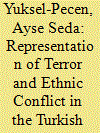

|
|
|
|
|
| Summary/Abstract |
This article explores the representation of the Kurdish issue in Turkey’s media. It does so by focusing on four newspapers that are representative of different ideological stances and economic relations with the Turkish government. The time period is during two key events: the Kobanî protests in 2014 and the elections in 2015. The research findings indicate that the media’s framing of the armed conflict between the Turkish state and the PKK is a contested discursive site; one determined not only by ideological affiliation but also by the relative politico-economic autonomy of the media institutions from the central political power.
|
|
|
|
|
|
|
|
|
|
|
|
|
|
|
|
| 14 |
ID:
137429


|
|
|
|
|
| Summary/Abstract |
Parallel to two intertwined processes of the politicization of ethnicity, religion and sexuality on the one hand, and the rise of the internet, on the other hand, hate speech has become one of the most topical issues of political debates. Academic interest on this topic has so far focused largely on the questions of (im)possibility of defining hate speech, on the hate speech/free speech dichotomy, and, thus on the possible ways of dealing with this big challenge of our times. This study tries to open a new window by resorting to the concept of human security. It argues that rival understandings of security (traditional or critical) lead to differences in perceptions of threats/harms which in turn lead to different conceptions of hate speech. This argument is illustrated through an analysis of the way the Kurdish issue in Turkey has been tackled in Ekşi Sözlük, one of the most popular web sites in the country.
|
|
|
|
|
|
|
|
|
|
|
|
|
|
|
|
| 15 |
ID:
129146
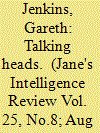

|
|
|
| 16 |
ID:
107155
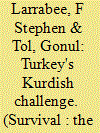

|
|
|
|
|
| Publication |
2011.
|
| Summary/Abstract |
Turkey has been wrestling with its Kurdish issue since the foundation of the republic in 1923. The early 'Turkification' policy of the Kemalist elite met strong resistance among the Kurdish minority and sparked several outbreaks of unrest, violently suppressed, in the Kurdish areas in the east and southeast. In 1984 the issue took on a new dimension when the newly founded Kurdistan Workers' Party (PKK) began conducting terrorist attacks against Turkish territory from safe havens in the Qandil Mountains of northern Iraq. The struggle against the PKK has so far cost 40,000 lives and has hurt both Turkey's internal development and its relations with its Western allies, especially the United States.
|
|
|
|
|
|
|
|
|
|
|
|
|
|
|
|
| 17 |
ID:
156095
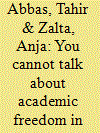

|
|
|
|
|
| Summary/Abstract |
In January 2016, 1128 predominantly Turkish intellectuals signed an Academics for Peace petition to draw attention to the conflict in southeastern Turkey. Their actions were met with outcry from the government, accusing the signatories of disloyalty to the state, even treason. This paper is an analysis of the responses of 60 of these scholars to a questionnaire sent to the entire Academics for Peace email list. Respondents, including 58 signatories, provided various perspectives on academic freedom in Turkey, as well as their own experiences of signing the petition. We contend that the responses faced by these intellectuals illustrate the homogenizing effects of power to silence criticism and ensure loyalty to the government and its ideas of Turkishness. It reflects a continuation of the suppression of academic freedom in Turkey, an issue that sees little sign of abatement or reform in the light of present challenges.
|
|
|
|
|
|
|
|
|
|
|
|
|
|
|
|
|
|
|
|
|